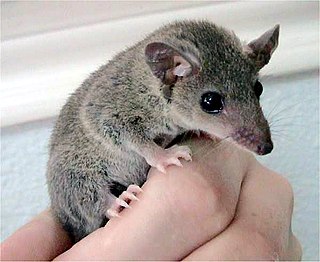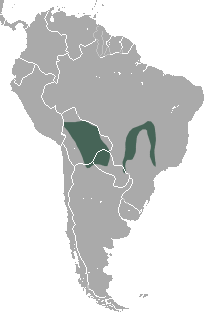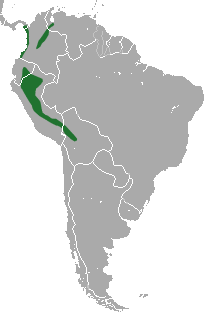
Opossums are members of the marsupial order Didelphimorphia endemic to the Americas. The largest order of marsupials in the Western Hemisphere, it comprises 126 species in 18 genera. Opossums originated in South America and entered North America in the Great American Interchange following the connection of North and South America.

Monodelphis is a genus of marsupials in the family Didelphidae, commonly referred to as short-tailed opossums. They are found throughout South America. As of January 2019, the most recently described species is M. vossi.

The gray short-tailed opossum is a small South American member of the family Didelphidae. Unlike most other marsupials, the gray short-tailed opossum does not have a true pouch. The scientific name Monodelphis is derived from Greek and means "single womb" and the Latin word domestica which means "domestic". It was the first marsupial to have its genome sequenced. The gray short-tailed opossum is used as a research model in science, and is also frequently found in the exotic pet trade. It is also known as the Brazilian opossum, rainforest opossum and in a research setting the laboratory opossum.

The northern red-sided opossum or the Guianan short-tailed opossum, Monodelphis brevicaudata, is an opossum species from South America. It is found in Bolivia, Brazil. French Guiana, Guyana, Suriname and Venezuela.

The yellow-sided opossum is an opossum species from South America. It is found in Argentina, Brazil and Uruguay. They have grey or black fur on their dorsal side with yellowish fur on the lateral side that continues down to the feet. They are the most mysterious of all the Monodelphis that is found specifically in the Pampean region or Pampa of Argentina. It is suspected to be a once-in-a-lifetime breeder as seen in a three-year observational study of one population in the marshy grasslands of the Pampean region. Maintaining their native grasslands is important for them to keep a stable population. They show sexual dimorphism in overall size: adult males are typically 100-150 g whereas adult females are 30-70 g.

The pygmy short-tailed opossum, scientifically named Monodelphis kunsi, is an opossum species from South America. M. kunsi is a marsupial from the family Didelphidae of the order Didelphimorphia. Although it is a marsupial, it lacks the characteristic pouch that is often associated with this order. It is found in Argentina, Bolivia, Brazil and Paraguay. M. kunsi is considered a smaller species within the family Didelphidae, which is why it is named a pygmy opossum. The young are referred to as 'joeys'. The females are referred to as 'Jill,' and the males 'jack'. It was thought to have been endangered in 2001, but has since been moved to least concern by the International Union for Conservation of Nature.

The southern red-sided opossum is an opossum species from South America. It is found in Argentina, Brazil and Paraguay.

Caenorhabditis is a genus of nematodes which live in bacteria-rich environments like compost piles, decaying dead animals and rotting fruit. The name comes from Greek: caeno- ; rhabditis = rod-like. In 1900, Maupas initially named the species Rhabditis elegans, Osche placed it in the subgenus Caenorhabditis in 1952, and in 1955, Dougherty raised Caenorhabditis to the status of genus.

The sepia short-tailed opossum is a species of opossum in the family Didelphidae found in Colombia, Ecuador, Panama, Peru and Venezuela.

The nematodes, roundworms or eelworms constitute the phylum Nematoda. They are a diverse animal phylum inhabiting a broad range of environments. Most species are free-living, feeding on microorganisms, but there are many that are parasitic. The parasitic worms (helminths) are the cause of soil-transmitted helminthiases.

Liguus fasciatus, the Liguus Tree Snails, also known as "living jewels", is a species of air-breathing land snail, a tree snail, a terrestrial pulmonate gastropod mollusk in the family Orthalicidae.
Caenorhabditis tropicalis is a species of Caenorhabditis nematodes, belonging to the Elegans super-group and Elegans group within the genus. It is a close relative of C. wallacei.C. tropicalis is collected frequently in tropical South America, Caribbean islands, and various islands in the Indian and Pacific Oceans from rotting fruit, flowers and stems. C. tropicalis was referred to as “C. sp. 11” prior to 2014.
Caenorhabditis plicata is a species of nematodes in the genus Caenorhabditis. It was described on carrion in Germany and is phoretic on carrion visiting beetles.
Caenorhabditis monodelphis is a species of nematodes in the genus Caenorhabditis. It was first collected by J. Raschka in Berlin, Germany in 2001. A second isolate was collected from Norway. It is a free-living species found in galleries inside of the fungus Ganoderma applanatum (Polyporaceae) which grew on the stump of a tree a few centimeters above ground. It is phoretic on beetles of the species Cis castaneus.

Caenorhabditis sinica, is a species of Caenorhabditis nematodes, belonging to the Elegans super-group and Elegans group within the genus. It is closely related to several species isolated from the lands adjacent to the Indian and Pacific Oceans, as well as to C. briggsae and C. nigoni. The species was known as “C. sp. 5” prior to 2014. C. sinica is known for having very high genetic diversity in its genome. Like other Caenorhabditis species, C. sinica is a ~1mm long roundworm with a transparent cuticle and that eats bacteria. Wild isolate strains of C. sinica have been collected from various rotting plant tissue substrates in temperate and tropical regions throughout China since its initial isolation in 2005.
Handley's short-tailed opossum is a species of mammal in the family Didelphidae. It is only known to exist in its type locality in Peru, and more recently in Brazil.

Xanthophyllum lanceatum is a tree in the Polygalaceae family. It grows across Southeast Asia from Sumatera to Bangladesh. The leaves are used as a hops-substitute in beer making and the wood as fuel. Fish in the Mekong regularly eat the fruit, flowers and leaves.












